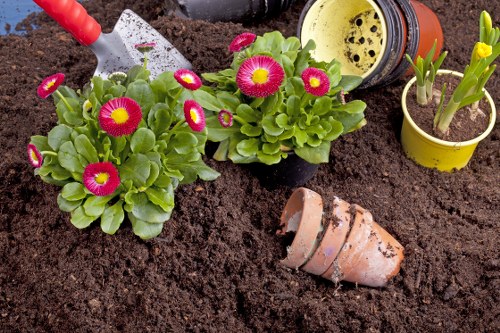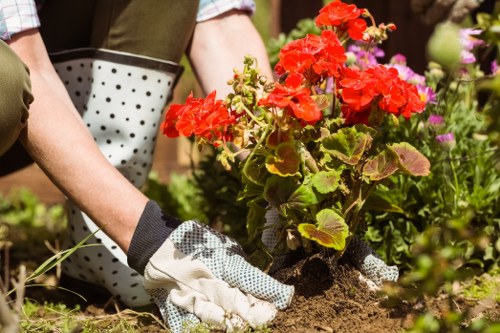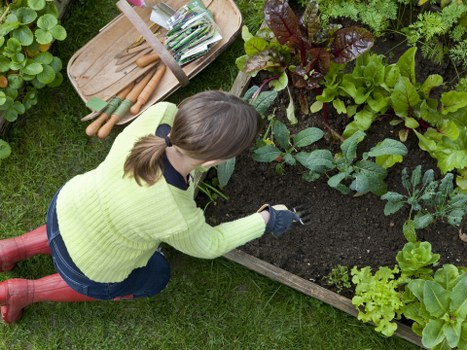Gardeners Coney Hall: Celebrating Green Innovation and Community Spirit
Introduction to Gardeners Coney Hall

Gardeners Coney Hall stands as a beacon of nature in a rapidly urbanized world. Nestled in an area that values tradition and innovation, this unique garden center and community space offers a wealth of green experiences for lovers of horticulture and landscaping alike. Steeped in history yet forward-looking in its approach, Coney Hall is a fusion of educational opportunities, sustainable practices, and community gatherings that celebrate flora and fauna in all their glory.
Visitors arrive at Gardeners Coney Hall with high hopes of exploring an enchanting blend of historical charm and contemporary gardening techniques. The welcoming environment, coupled with knowledgeable staff and a strong sense of local pride, transforms every visit into a memorable encounter with nature. Whether you are an experienced gardener or new to the world of plants, the space is designed to inspire creativity and encourage the growth of your own garden dreams.
From its inception, Gardeners Coney Hall has focused on merging locally inspired traditions with modern developments. The facility acts as a repository for invaluable gardening wisdom gathered over the decades and incorporates new eco-friendly methods. Green innovation here is not just a buzzword—it reflects the commitment to sustainability and education at every level.
The History and Legacy of Coney Hall

The story of Coney Hall begins with its classic architecture and an equally storied past. Originally established as a humble manor surrounded by abundant natural landscapes, the estate transformed over time into a vibrant community hub. The legacy of the hall is carried by generations of gardeners who have nurtured both the grounds and the local community, making it a symbol of resilience and growth.
Coney Hall has not only witnessed dramatic changes in landscaping trends but has also been the site of pioneering horticultural experiments. Historical records suggest that dedicated gardeners introduced techniques earlier than their time, blending traditional methods with progressive ideas that are now seen as cornerstones of organic gardening. The hall’s own garden beds are lived-in testaments to innovative practices that have shaped modern sustainable horticulture.
Today, the historical influence of Coney Hall is visible in every corner of the property. Detailed archival documents and vintage illustrations remind visitors of a time when gardens were a vital part of family life. The blend of old-world charm with modern, sustainable approaches serves as a lesson in how communities can successfully bridge the gap between legacy and progression.
Innovative Gardening Practices and Techniques

At Gardeners Coney Hall, innovation meets tradition in inspiring ways. The center is committed to sustainable landscaping, offering workshops on organic gardening, permaculture, and water-wise gardening techniques. Among the many programs available, visitors often learn about the benefits of companion planting, crop rotation, and the use of natural fertilizers. Each technique is rooted in tradition but infused with scientific research and eco-friendly initiatives.
The garden spaces are meticulously organized to showcase seasonal colors, textures, and fragrances. The layout of the gardens encourages not only aesthetic pleasure but functional utility, such as local food production and habitat conservation. Visitors can explore themed gardens, including sensory gardens, butterfly gardens, and urban edible landscapes, each designed to demonstrate sustainable practices applicable on both small scales and larger landscapes.
Interactive workshops led by expert horticulturists and hands-on demonstrations ensure that attendees leave with practical knowledge. These sessions are aimed at gardeners of all ages and skill levels. A special focus is placed on creating low-maintenance gardens that thrive in urban settings, making it easier for busy individuals to maintain a healthy green space. As a result, many locals credit Coney Hall with sparking a renewed interest in community-supported agriculture and backyard gardening.
Community Involvement and Environmental Sustainability

Community involvement is the cornerstone of Gardeners Coney Hall’s ethos. Regular events bring together local residents, families, and budding gardeners to share insights and celebrate nature. The space hosts seasonal festivals, educational fairs, and volunteer gardening days, making it a dynamic hub for environmental learning and social engagement. The friendly, welcoming atmosphere fosters a deep sense of responsibility towards preserving the natural environment.
The emphasis on
In addition to environmental efforts, there is a strong commitment to local education and knowledge sharing. On-site classes and seminars are offered on topics ranging from urban gardening to climate adaptation in horticulture. The hall serves as both a visual textbook and a playground for green innovations. This balanced approach is ideal for inspiring confidence among new gardeners while progressively challenging seasoned professionals to explore new ideas in landscaping and design.
Nearby Areas and Unique Coney Hall Communities

Gardeners Coney Hall not only shines as a local jewel but also acts as a vital link between a network of nearby communities. These neighboring areas, each with its unique character and historical significance, have been nurtured by shared interests in nature, heritage, and sustainable living. The proximity of these locales enhances the overall cultural landscape, creating a supportive environment for both local businesses and green enthusiasts.
The surrounding areas exhibit qualities that are closely aligned with the values of Gardeners Coney Hall. For instance, Brookside is known for its rolling meadows and vibrant community gardens, while Riverside offers lush riverbanks that serve as nature trails and picnic spots. Each nearby community brings its signature balance of nature and urban comfort, contributing to a regional identity that celebrates eco-friendly living.
A closer look at these areas reveals a lot of mutual influence. Local markets, annual garden festivals, and cooperative programs have sprouted in neighborhood centers like Meadow Park and Greenfield. These communities prioritize sustainable gardening and organic practices, ensuring that innovations at Coney Hall are echoed in their very own backyards. Lists of local initiatives and green events further underscore the network of support that exists among these areas:
- Highland – Known for its terraced gardens and eco-friendly initiatives.
- Maple Grove – Offers tranquil walks under historic maple trees and community picnic spots.
- Oakwood – Celebrated for its deep-rooted community traditions and local flora.
- Sunnyvale – Features modern urban gardens and innovative landscaping projects.
- Pinecrest – Famed for its natural preserves and dedicated environmental programs.
- Lakeside – A serene environment that blends waterfront activities with garden tourism.
- Hilltop – Offers panoramic views and spaces for public art inspired by nature.
- Valley View – A growing hub for local organic farmers and botanical education.
Expanding the Horizons: In-Depth Look at Community Programs and Educational Outreach
The educational opportunities at Gardeners Coney Hall are an extension of its commitment to community growth. Offering a range of classes and workshops that cover diverse topics related to gardening and sustainable practices, the center caters to both budding enthusiasts and expert horticulturists. These programs are structured and presented in an accessible format, ensuring that anyone, regardless of experience level, can benefit.
A notable feature of these educational programs is the emphasis on experiential learning. Participants not only learn the theory behind sustainable gardening but also apply these techniques in live demonstrations. For instance, attendees might take part in setting up raised garden beds or learn the intricacies of drip irrigation systems. Additionally, the sessions cover the use of heirloom seed varieties and organic pest management, which are crucial for maintaining a balanced ecosystem in urban gardens.
Support for these programs comes from partnerships with local schools, community groups, and environmental non-profits. By collaborating with renowned horticulturists, Gardeners Coney Hall continually updates its curriculum, ensuring that the information remains relevant and impactful. These efforts have turned the hall into a center of excellence for sustainable urban living.
Highlighted Benefits for Community Members
Participants in the various programs receive hands-on training that is applicable not only to their personal gardens but also to community projects. This knowledge-sharing culture fosters an environment where debugging common gardening challenges is both a shared duty and a joy.
Long-Term Impact on Local Horticulture
The knowledge transfer from expert gardeners to local residents creates an enduring impact on the region’s horticultural landscape. Many alumni of these programs have gone on to lead local garden projects, spread sustainable practices, and even contribute to environmental policy discussions. This ripple effect demonstrates the transformative power of community-focused education.
The Role of Technology in Enhancing Green Spaces
Another intriguing aspect of Gardeners Coney Hall is its integration of advanced technology into gardening practices. Modern tools and smart systems have been introduced to monitor plant health, optimize water usage, and manage soil quality. These tech innovations have been embraced by the local community, making the hall a showcase for how digital solutions can merge seamlessly with nature.
For example, automated irrigation systems and mobile apps that track garden growth trends allow even first-time gardeners to maintain flourishing landscapes with minimal hassle. Additionally, the use of virtual reality (VR) in educational sessions helps users experience garden designs and sustainable techniques in immersive simulations, bridging the gap between theory and practice.
Such innovative approaches are complemented by traditional horticultural wisdom. The synergy created by integrating new technologies with time-tested methods ensures that Gardeners Coney Hall remains at the forefront of urban gardening practices while nurturing a deep respect for the timeless beauty of nature.
Local Partnerships and Regional Impact
Gardeners Coney Hall draws strength from its partnerships with local businesses, environmental groups, and municipal organizations. Collaborations have led to public garden projects, urban tree planting initiatives, and sustainability fairs hosted regionally. Through these cooperative efforts, the hall has significantly contributed to enhancing the quality of urban spaces.
The hall actively involves local artisans and businesses in its events, offering them platforms to display garden-related products and services. These collaborations provide valuable exposure and encourage the growth of local economies built around the ideals of sustainability and environmental stewardship.
Moreover, Gardeners Coney Hall serves as a model for similar green initiatives across the region. Its influence has spurred governmental bodies to engage in projects that incorporate eco-friendly design practices, secure funding for renewable energy projects, and improve waste management in urban communities.
Planning for Future Generations
Looking ahead, Gardeners Coney Hall is expanding its vision to include future educational and community programs aimed squarely at younger generations. Scheduled events include workshops for school children, interactive sessions for teenagers, and volunteer days that invite family participation. The goal is to plant the seeds of environmental responsibility in the minds of the young, ensuring that the torch of sustainable living is passed on.
Investments in state-of-the-art greenhouses, advanced irrigation systems, and digital kiosks for information dissemination are some of the measures being taken. All initiatives are designed to evolve with the changing needs of the community while respecting the legacy of tradition. In doing so, Gardeners Coney Hall pledges to remain a nurturing ground for both plants and people alike.
The future plans also include the implementation of research-based projects in botanical sciences. Collaborations with universities and research centers are expected to drive innovation in urban farming, creating proof-of-concept trials that can then be shared with the broader community. As a result, the hall not only remains a sanctuary for green lovers but also becomes a launchpad for scientific exploration and sustainable development.
Integrating Art and Culture in the Green Space
The artistic dimension of Gardeners Coney Hall is significant. Many local artists have found inspiration in the vibrant flora and serene landscapes of the hall. Periodic art exhibitions and sculptures set among the flower beds not only beautify the garden but also serve as a bridge between ecological art and traditional landscape design.
This creative approach is evident in collaborative projects where artists and gardeners work together to create themed spaces. Such projects often highlight the cycles of nature—from seasonal blooms to the quiet dormancy of winter—and celebrate the continuous exchange between art and life. The resulting installations add another layer of meaning to the garden, making it more than just a meeting ground for nature enthusiasts.
Furthermore, collaborations with local cultural centers and art schools ensure that new artistic talents are nurtured. The hall’s unique blend of art and horticulture makes it a living museum that honors both natural beauty and creative expression.
Environmental Stewardship and Global Trends
Beyond local borders, Gardeners Coney Hall is aligned with global trends in environmental stewardship. The practices adopted here mirror those recommended by international environmental bodies, encouraging reduced carbon footprints, biodiversity conservation, and eco-friendly landscaping. By integrating global strategies into local practices, the hall has become a model for sustainable urban living.
Key initiatives include using organic fertilizers, reducing chemical inputs, and employing renewable energy sources to power greenhouse operations. These practices are not only important for the local ecosystem but also serve as an example for other communities that aspire to adopt sustainable methods. The commitment to environmental responsibility is evident in every facet of the hall’s operations.
Workshops and seminars at the hall often feature guest speakers from various parts of the world, addressing topics such as climate change adaptation, innovative water management, and the importance of urban green spaces. This global connection enriches the local experience, making Gardeners Coney Hall a microcosm of worldwide efforts to embrace and protect nature.
Frequently Asked Questions
Q1: What makes Gardeners Coney Hall unique?
A1: Gardeners Coney Hall stands out due to its perfect blend of historic charm and modern sustainable gardening practices. The community-driven environment and extensive educational programs are additional highlights that make it truly unique.
Q2: Are there programs available for beginner gardeners?
A2: Yes, Gardeners Coney Hall offers a variety of workshops and hands-on sessions specifically designed for beginners. These programs cover the basics of organic gardening, sustainable landscaping, and urban farming techniques.
Q3: How does Coney Hall support local sustainability efforts?
A3: The hall supports sustainability through numerous initiatives such as composting workshops, water-saving projects, and partnerships with local schools and environmental groups. These efforts ensure that sustainable practices are shared throughout the community.